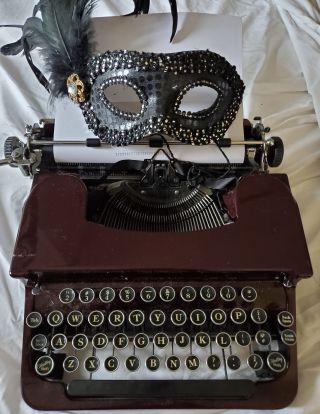Imposter Syndrome
Imposter Syndrome and Novelists: A Perfect Match?
Personal Perspective: Observing others is both alienating and the only way to create character.
Posted July 1, 2024 Reviewed by Michelle Quirk
Key points
- Observing and researching accurately—the sine qua non of responsible writing—implies not belonging.
- The obsession with "cultural appropriation" subverts a key tool in creative writing.
- The job of a novelist is to systematically, day-by-day, pretend to be the characters we write about.

This is the second in a two-part series about writers and imposter syndrome: The first can be found here.
If the lack of objective standards for the trade they ply makes writers in general vulnerable to imposter syndrome, how much more vulnerable must be writers of fiction? For the job of a novelist is to systematically, day-by-day, pretend to be the characters we write about—to pretend we are a person who is not us, a human often of different culture, or gender, or personal history, or all three. Even when we're describing someone of roughly similar background, to fully inhabit that character's mind is to live inside a radically different and often hostile wilderness populated by vipers of insecurity and tigers of strength that are not our own.
This is no casual thing. Sometimes, when writing from a character's point of view in a café, I have noticed people staring, and realized my body was enacting the movements my character was making in the story, leaning in to argue, falling back to dodge a blow; that's how deeply I was inhabiting the person in question. In my novels, I have been a working-class Cape Cod fisherman and a bourgeois French war reporter. I have also been a mentally challenged nine-year-old, a male-presenting East African customs inspector, a female South American musician, a Finnish sailor who befriended Jay Gatsby, a bisexual arms dealer, and a young woman who finds artistic success in New York's East Village at the same time that she learns she has a mortal illness.
Here's a big part of the problem. If I spend my days as a novelist inhabiting other people, it logically follows that for a good chunk of my life I don't feel rooted in a single identity. During all those hours, days, and weeks I spend being someone different, I can no longer be a "normal" person, born and brought up in one culture, one language, one neighborhood; someone whose memories and references are roughly identical to those shared by everyone else of my generation and locus. (One could go further here, wondering if "normal" people who have most details of their lives in common with their neighbors are becoming rarer in an increasingly mobile, de-localized society; and whether the near-infinite complexities of personality don't make all of us, in one way or another, "imposters" to other humans. But those questions belong to a different post.)
This is why the current fad against "cultural appropriation" is a frontal attack on the novelist's profession, which is to switch identities as fully as we are capable of no matter what the fictional character's background might be. Comparing differences in personal character between two almost infinitely complex human minds, as opposed to contrasting cultural or gender-based dissimilarities between people, feels like comparing the Grand Canyon to a storm drain. It is an insult to the great depth and power of our shared human DNA. To say novelists can't write about people who are not from our own background is to cut the fiction writer off from the world; it logically implies the only story we're allowed to write is our autobiography.
But there is another, even more important element at work in making writers vulnerable to imposter syndrome. As people whose goal it is to find within our characters and stories the purest and most essential truth of the worlds we describe, writers have—just as much as journalists—an ethical obligation exhaustively to research, investigate, quantify, and understand every detail of the real-life background and histories of any given character, no matter where they, she, or he came from. This makes us professional observers: and implicit in the status of observer, as any United Nations peacekeeper or human rights "observer" will tell you, is the obligation to stay separate, to not belong—not be forced by cultural ties to take sides—in order to fairly and objectively bear witness.
I once met a girlfriend at a party thrown by a cocaine dealer-to-the-stars in a downtown Manhattan townhouse. Even though I wasn't a client or a star, I was young, I believed I was hip, and I thought I fit in. The girlfriend told me later that the dealer immediately had me tailed by her bodyguards as I wandered around her mansion. "He's always watching," she apparently told the bodyguards, "he could be a narc." Even then—I had only published one novel at the time—I had taken on the motley of an observer, and with it the status of someone who didn't belong; who was, by pretending to belong somewhere I did not, a fraud. (Is it any wonder that I've always had a fondness for novels about spies, another category of outsider who's always observing while also trying to fit in?)
Curiously, I have never had the slightest doubt as to the authenticity and "belonging-ness" of any of my characters, whether female, South American, or absurdly young; nor have any—not one!—of my readers or reviewers. The imposter syndrome applies to me: George Michelsen Foy, the alleged writer; when I leave my characters in their world and must live in my own.
But for fiction writers, the question of imposter syndrome also summons this paradox: Does not belonging, while lonely, alienating, and sometimes even corrosive on a personal level, give us the tools crucial to becoming anyone we want? Does the lack of impartial standards as to the worth of one's own work, by making success tough to achieve by formula, actually give us the freedom to write in fresh directions? Does all this not open up an entire galaxy of characters who would be invisible to us if we were tied down, emotionally and intellectually, to a single, fixed, predictable, default identity? If observing makes us separate from everyone, is this not the choice we have made to record with precision?
Is being an imposter, in the end, what allows writers to do our job?


